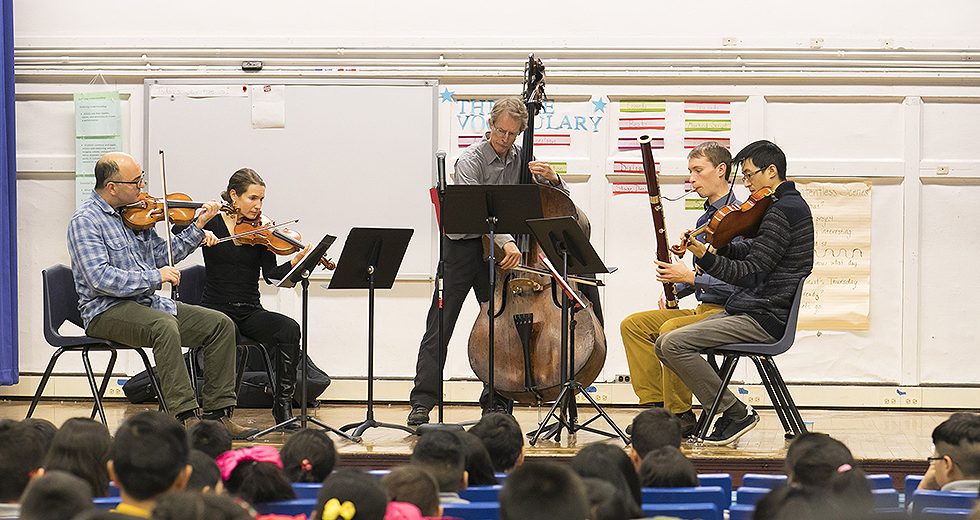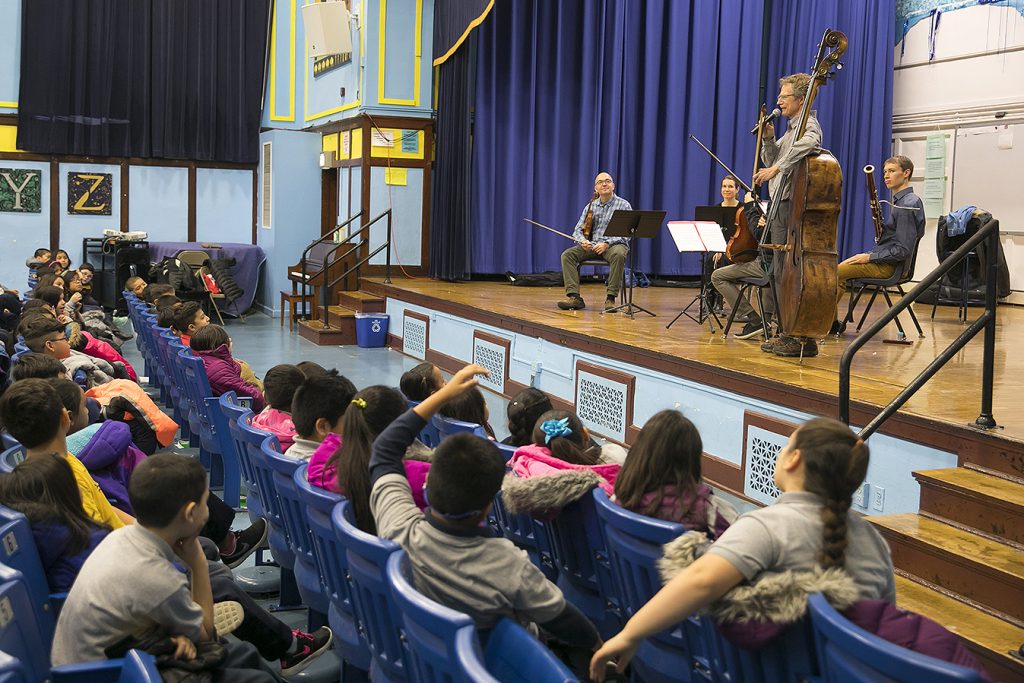
Throughout March, the Chicago Symphony Orchestra participates in the nationally recognized Music in Our Schools Month campaign.
The Negaunee Music Institute, the CSO’s educational and community-engagement branch, offers a diverse range of programs for audiences that connect local communities with the CSO’s music-making and the power of music. The Institute’s student programs demonstrate the CSO’s strong belief in the value of music education and its efforts to make music more accessible to Chicago-area pupils.
One of the programs that directly impacts school-age youth and helps to fill gaps in students’ music education is CSO-Connect. This program, which currently involves five elementary Chicago Public Schools, guides music teachers in creating courses that explore a theme tied to the CSO’s school concerts. This season, CSO-Connect focuses on concept of courage as exemplified in Richard Strauss’ musical representation of Cervantes’ novel Don Quixote.

CSO bass Daniel Armstrong fields questions from students at Sawyer Elementary School during a Negaunee Music Institute-sponsored event in December. | © Todd Rosenberg Photography 2016
“Courage is represented by orchestral works, the lives of composers, and day-to-day habits of musicians and artists who are pursuing a career that requires incredible discipline and sacrifice,” said Jon Weber, the NMI’s Director of School and Family Programs. “We’re hoping the students come away … having a few new role models or examples to draw from as they encounter challenges or points of growth in their lives.”
The CSO-Connect program also features in-school performances by CSO musicians and fellows from the Civic Orchestra of Chicago. The 14 Civic Fellows created a 45-minute interactive presentation based on Don Quixote and has performed it for students in each of the five schools.
Violist Kip Riecken is one of the Civic Fellows leading the performances of Don Quixote. “Doing this work gives us an opportunity to find more meaning in this music than we would have if we were just constantly practicing it,” Riecken said. “We’re trying to show [students] how somebody can take a story and show it in a way beyond words.”
By adding text and movement to the story, the Civic Fellows brought Don Quixote to life for students. For instance, in the work’s “sheep section,” Riecken said, the Civic Fellows had students rub their hands together to imitate the sound of sheep walking through grass.
Civic Fellow and bassoonist Midori Samson, who participated in the Don Quixote concerts, said her best work happens when she’s performing for a community that can reawaken her love of music. “I get to go out to a place I would never go and meet people I would otherwise never meet, and they suddenly bring to life the music,” Samson said. “My best playing by far is when I’m in front of 200 second graders who are really approaching my limits of concentration and challenging me to step it up.”
In addition to providing instruction for CPS students and expanding Civic Fellows’ skill sets, the CSO-Connect program also supports teachers by providing professional development opportunities as well as allowing them time to collaborate across different disciplines through workshops.
“Teachers are often overloaded with responsibilities,” Weber said. “In many schools, music teachers operate like islands. They may know that there is another music teacher at a school nearby, but there are very few opportunities for them to be together in the same room, let alone learn from each other and help each other.”
Nicholas Hall, the music teacher at Agassiz Elementary School, said he very rarely gets time to collaborate with other teachers, due to his busy schedule. With the professional development provided by the CSO, Hall said he is able to plan with other teachers interdisciplinary units about the themes of bravery and courage.
Hall also had time to work with music teachers from different schools. “I’ve gotten to sit down and talk with other music teachers, and we had a great discussion … where we all presented our projects and gave each other feedback,” he said. “The opportunity to work with other schools is really limited, and I think we’ve really grown [by] collaborating. The quality of the professional development has been really good.”
In March, each of the Civic Fellows will return to one of the five elementary schools, mentoring the students and helping them to further develop a project centered on their exploration of Don Quixote. At Agassiz, students are creating poems in their language-arts class about issues that are important to them. They will then recite their poetry, accompanied by music they also have created. In May, there will be a culminating event in which students from each participating school will present their projects.
The CSO-Connect program is one example of the partnerships the Institute has developed in response to the needs of CPS schools. The program was developed, in part, with guidance from Ingenuity, a group that collects data and helps to pair arts organizations with Chicago Public Schools. Nicole Upton, director for partnerships and professional learning at Ingenuity, said the CSO is one of Chicago’s largest providers of arts programming for CPS. She regards the CSO as a leader among partners.
“The types of programs the CSO is offering are tremendously diverse,” she said. “The way that they think about how they fit into the narrative of a student’s exposure to music throughout their school career is really robust and a model for a lot of other organizations to look at.”
Jason Fahrenbach, a teacher at Disney Magnet School, has been involved with the CSO’s educational outreach programs for several years and is participating in this year’s CSO-Connect program. Fahrenbach said the CSO has developed its programs over time to be more inclusive for students, as well as more beneficial for teachers. “The main focus of how I’ve seen the program change is it’s trying to meet the needs of 100 percent of the students,” he said.
In addition to the CSO-Connect program, Civic musicians have done other projects with CPS students, including the Civic’s Bach Marathon in November, as well as a year-long mentorship program with Lincoln Park High School students.
While the CSO Institute is proud of the partnerships it has developed with CPS, Institute staffers are always looking to expand their work, particularly for students in band and orchestra programs, Weber said. Enhancing instrumental programs across the city, he added, is a “natural fit” for the Chicago Symphony Orchestra.
In the 2018-19 season, the CSO will celebrate centennials of two of its most important programs: The Civic Orchestra of Chicago and the CSO’s concerts for children. Although celebration plans and programs have not yet been solidified, Weber sees the anniversary as a great opportunity for the CSO to think about how to start its second century of work serving schools and youth across Chicago.
“This is a great prompt for us to think about how successful our work has been, where we want see it grow, and where we can be more impactful in serving the needs of our community,” Weber said. “We really try to make sure the youth in [our] programs have a rich, sequential experience that creates the greatest opportunity for them to have a really transformational experience when they hear the orchestra perform.”
Jennifer Hepp, a student of Northwestern’s Medill School of Journalism and the Bienen School of Music, is a reporter on the Daily Northwestern.
TOP: CSO musicians perform in a CSO-Connect concert at Sawyer Elementary School. | Todd Rosenberg Photography 2016